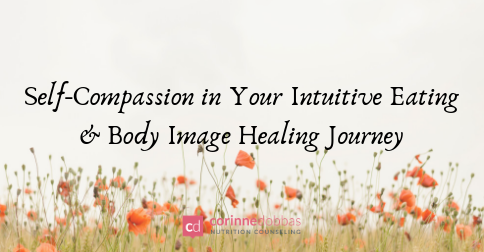Self-Compassion in Your Intuitive Eating & Body Image Healing Journey

On a scale of 1-10, 1 being no self-compassion whatsoever and 10 being so much self-compassion you just can’t contain it anymore, what number would you rank yourself on the self-compassion meter?
Seriously. What number would you give yourself?
Why?
Because self-compassion (showing yourself the same kindness you’d show a friend) can be a game-changer in your intuitive eating and body image healing journey. For the simple reason that it’s really hard to make peace with food and your body, if you’re constantly at war with yourself. Really hard.
At first, however, it’s something that may feel totally foreign and weird. If that’s the case for you, that’s OK.
Because the good news is that you can start practicing self-compassion anytime – even starting now.
Again, it’ll likely feel weird and uncomfortable at first, but that’s why it’s called a practice. It’s something you practice for life, and some days we’re better at it than others and that’s OK. That’s normal. That’s life.
Personally, self-compassion is a vital tool for my mental well-being and health. To show myself self-compassion, I usually ask myself: if a client or friend was telling me what I’m telling myself, what would I say to them?
It’s a super simple question, but a super helpful one to give me perspective.
An example of how to practice self-compassion in your intuitive eating & body image healing journey
Below is an example, so you can see what I mean. The example highlights how to show yourself self-compassion to move through a challenging food and/or body image moment. The difference is palpable.
Negative self-talk >>
I’m so lazy. I’m always behind in my work. And I’m adult and don’t even know how to properly eat! And today, I just feel gross in my body. I’m such a loser.
Compassionate self-talk >>
You’re not lazy, love. You’re exhausted. You haven’t been making time for yourself. You’re running on empty. No one can run on empty. Give yourself a break today and when you’re ready come back and put dates on the calendar for when you think it’s reasonable, for the season of life you’re in, to get things done. That always works for you and makes you feel better. And, no one taught you how to eat normally. My goodness, look at all the comments about food and bodies that you were surrounded with growing up! Take a deep breath and know you’re doing important work and everything will come together. Go for a walk and come back and take a bath later today. That always helps you feel better.
Now, after reading both examples of self-talk, which leaves you feeling better? Which leaves you feeling motivated to heal? Which leaves you feeling more calm, so you can step back and then make the next best decision for you?
Speaking to yourself with self-compassion usually feels hard at first because you’re training your brain to think in a totally different way. But, it does feel easier the more you do it.
The practice of self-compassion is helpful because it allows you to:
- Step outside of yourself and observe, not judge yourself,
- View your situation as part of common humanity (somewhere in the world at some time someone has felt exactly how it is you’re feeling),
- Honor your feelings, but not over-identify with them,
- Recognize all the good that is going on for you (not just the bad), and
- Be kind to yourself.
On that note, I encourage you to explore by motivating yourself with loving kindness instead of criticism and see what happens.
As Louise Hays says, “Remember, you have been criticizing yourself for years and it hasn’t worked. Try approving of yourself and see what happens.”
Lastly, I’ll leave you with an eloquent quote by self-compassion researcher and author, Dr. Kristin Neff: “Unlike self-criticism, which asks if you’re good enough, self-compassion asks what’s good for you?”
I highly recommend you start asking what’s good for you, as a whole person, mentally, emotionally, physically, and spiritually and see how it goes.
With love,
Corinne
